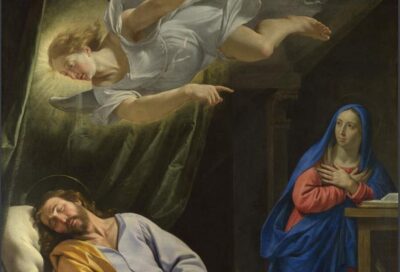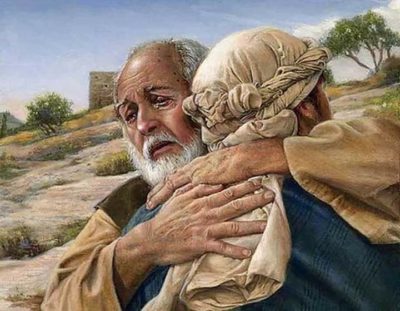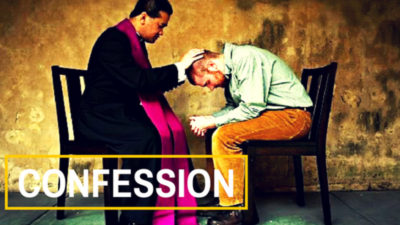December 18, 2022
|by N W
|
0 Comments
|
Advent, Christmas, Deacon Mark, Eucharist, Mary, Sin, St. Joseph
Fourth Sunday of Advent
December 18, 2022 — Year A
Readings: Is 7:10-14 / Ps 24 / Rom 1:1-7 / Mt 1:18-24
by Rev. Mr. Mark De La Hunt, Permanent Deacon
Mary and Joseph have finally arrived on the Advent stage. Before we talk about them, though, let us take a moment to appreciate the history regarding the selection of the scriptures we have heard from the First Sunday of Advent on November 27 to now. I want us all to be more aware of the thought and prayer that went into selecting the readings, so that we can be more thankful for the gift of the Catholic Church, which selected them.
In compiling the lectionary readings for Advent, researchers prayerfully studied lectionaries covering a period of 1,500 years! They selected only the best and most traditional readings from ancient Rome, Old Spanish, Gallican or French, and other western churches. How blessed we are to be family members of such a Spirit-led Christian tradition. Within this tradition, every Advent Sunday to Advent Sunday there is a progression of theme to prepare us for Christmas. “Christ will come again (1st Sunday), Christ does come today (2nd and 3rd Sundays), and Christ has come (4th Sunday) (Wallace, 47).”
Today is the (Vigil or) 4th Sunday of Advent, and fittingly St. Matthew writes, “Now this is how the birth of Jesus Christ came about (Mt 1: 18).” And he quotes the prophet Isaiah, writing that He shall be called Emmanuel, which means “God is with us.” With Jesus’ arriving, note that John the Baptist has exited the stage of God’s great play or, as Bishop Barron calls it, “theo-drama,” having played his role of “preparing the way of the Lord (Mt 3:3).” Joseph and Mary now take the stage, but today the stage spotlight is really on Joseph. Mary will take the starring role at Christmas.
In the commentary book on the gospel of Matthew by Dr. Ed Sri and Curtis Mitch, today’s gospel passage is entitled the “Annunciation to Joseph (Sri, 42).” This makes so much sense. Like Mary’s annunciation, an “angel of the Lord appeared to him in a dream” and told him Mary’s baby was conceived through the Holy Spirit (Mt 1:20). For the record, though, Joseph’s annunciation differed from Mary’s in two ways. First, the archangel, Gabriel, spoke to her in person, not in a dream, and second, Joseph’s annunciation comes after the fact; Mary is already with child.
Prior to the angel’s arrival, Joseph had been discerning what he should do about the fact that his new wife was already pregnant, even though they had not consummated their marriage. Being a “righteous man,” he decided he would divorce her as required by Jewish law (Dt 22: 20-21). Jewish law required stoning as punishment, but with Israel under Roman rule in Joseph’s day, Roman law was in play. It prescribed a public trial in place of a stoning. However, Joseph chose to keep the divorce private so as not to shame her (Mt 1:19).
Joseph was being exceptionally merciful here. Can you imagine how much he hurt inside thinking his wife had been with another man while he had been waiting to consummate the marriage according to Jewish custom? Pain causes most of us to lash out in anger, wanting to cause pain in the one who caused it in us. Surely Joseph was not just a caretaker chosen by God to care for Mary and Jesus. No, no, no, he loved Mary so much that his love triumphed over the pain of the perceived betrayal.
Nevertheless, being a follower of the law, he has chosen to divorce her quietly, but then God sends him an angel to give him new direction. I bet the angel’s arrival was in response to Joseph praying something like this, “Lord, I will divorce her according to your law, but not my will, but yours be done.” Maybe he even taught the second part of that prayer to his future son.
Note that as God so often does when He is giving us a new direction for our life, He directed the angel to first remove Joseph’s fear: “Joseph…do not be afraid (Mt 1:20).” After reassuring him, he gave Joseph a new path, “…take Mary your wife into your home…it is through the Holy Spirit that this child has been conceived…. She will bear a son, and you are to name him Jesus (Mt 1: 20-25).” Joseph knew this message was an answer to his prayers, not just a crazy dream. Accordingly, he surrenders to God’s will, takes Mary into his home and names the baby Jesus. And by the way, to name a child is to make it your own and thereby, since Joseph is in the line of King David, Jesus, through Joseph, becomes a part of that line as the prophets foretold.
The names Jesus and Emmanuel are important. Jesus is derived from the Old Testament name Joshua which means “Yahweh is salvation (Sri 45).” We need to be saved. To be saved is to be freed. Sin is what we need freedom from, not political powers, not our guilt, and not a lack of acceptance by others of our behaviors. Sin can destroy both the body and the soul; it is the greatest threat we face. It causes us so much confusion, pain, and suffering. And if we do not seek God’s forgiveness for it, that pain and suffering become eternal after we die. How can Jesus, a man, save us from a threat of eternal consequence?
This is how. Matthew says the baby Jesus is the “Emmanuel” prophesied in today’s first reading from Isaiah. In other words, Matthew is telling us that God Himself is present in Jesus (Sri 47). The message that Jesus is God present with us is so important that Matthew’s gospel mentions it in the first chapter that I just proclaimed and in the last when Jesus says, “Behold, I am with you always, until the close of the age (Mt 28:20).”
I am going to digress a minute to mention a heresy that still exist among Christians related to today’s gospel. The next verse after the last one in today’s gospel is, “He had no relations with her until she bore a son… (Mt 1:25).” I bring it up because this verse has been used by some as an argument that Mary did not remain a virgin as has been taught for two thousand years. They think the word “until” means Joseph and Mary had relations after Jesus was born. That is heresy and it has been around since the 300s. In the year 383, St. Jerome shot down this heresy with numerous quotations from scripture including Jesus saying, “I am with you until the close of the age (Mt 28:20).” Referring to Jesus’ words, St. Jerome sarcastically asked the heretic, Helvidius, “if he thought the Lord would then forsake His disciples after the close of the age (Hahn, 106).”
Now back to the homily…When reading and listening to reflections on the 4th Sunday of Advent, a common reflection emerges. Dr. Ed Sri, Fulton Sheen, Peter Kreeft and others point out that Christianity differs from mere religion in that it is not so much about people seeking God, but about God seeking us (Sri 47). Dr. Sri points out that after Adam and Eve sinned, “they hid themselves from the presence of God (Gn 3:8), and ever since, God has been seeking to bring us back into an intimate relationship with Him (Sri 47). He wants to be wedded to us, and Jesus fulfilled His Father’s desire in His very personhood. Jesus IS the marriage of humanity and divinity (Barron on Hallow app). And He consummates that marriage at every Mass, giving us His body at the Wedding Supper of the Lamb (Rev 19:9). God came to us to bring us into His Holy Family; that is Christmas.
Mary had THE Annunciation. Joseph had his annunciation, the shepherds outside Jerusalem had theirs. And you and me and every humble Catholic around the world has their own annunciation at every Mass. For the priest and deacon hold up the sacred bread and declare to you what it really is, not a symbol, but the Body of Christ. We just might as well say, “This is Jesus whom Mary conceived in her womb through the Holy Spirit. Do not be afraid, but take Him under your roof, for He is your savior (Mt 8:8).” This is the bread of which Jesus said at least four times, “Whoever eats this bread will live forever (Jn 6: 50, 51, 54, 58).” These are Jesus’ words to us. Jesus is God, and what He says is. And at the moment we receive this bread of angels we, like Mary, give our fiat, Amen. “May it be done to me according to your word (Lk 1:38).”
Citations:
CatholicIreland.net: Origins and development of Advent. November 30, 1999
Curtis Mitch and Edward Sri. Catholic Commentary on Sacred Scripture: The Gospel of Matthew. Baker Academic 2010.
James A. Wallace. Preaching to the Hungers of the Heart; The Homily on the Feasts and within the Rites. The Liturgical Press 2002.
KEEP READING
 540-586-8988
540-586-8988 




